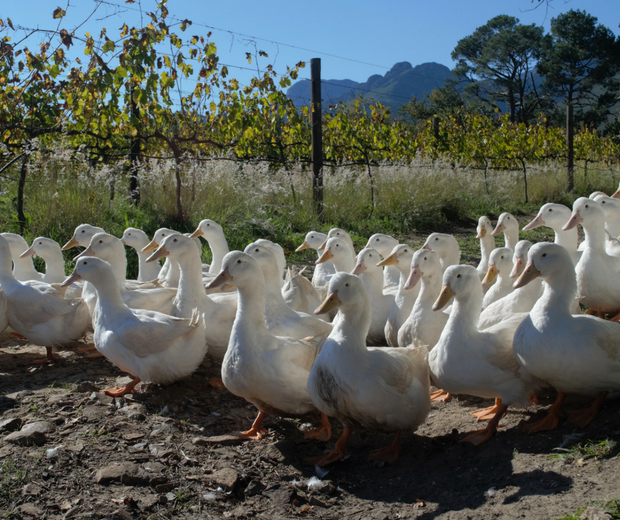ALSO READ: How to order wine in a restaurant
Heading out to the Winelands for a day of wine tasting can be fun, social and informative. Gathering a group of friends, and visiting a wine farm or two is a great way to learn about wine. Usually there is a delicious lunch to look forward to, and let’s not forget the discounted wines at cellar door prices!
I’ve been on many wine tasting excursions, both in South Africa and abroad, but after a while it can seem a bit formulaic. The tasting room experience can be dull, repetitive and even, dare I say it, uninspiring? The attendant rattles off the details of the wine and after a while, it can feel like someone is aiming a wine-knowledge machine gun at you.
The Eco Wine Safari is Avondale’s answer the tired wine tasting experience. The excursion starts at the tasting room with a few introductory sips of Avondale MCC to get the afternoon started. Having only just stepped into the tasting room, we almost immediately head back out to the parking lot, and pile into a fun (but comfortable) tractor trailer. Off we head into the vineyards and gradually uphill towards the Klein Drakenstein mountains.
Every decision at Avondale is guided by biodynamic principles. The whole farm, and it’s wines are EU certified Organic, but that’s really only just the beginning. Our guide, Sales Manager Tom Mills explains the farming philosophy of Avondale, “biodynamic farming works in harmony with the rhythms and cycles of nature, emphasising that each facet of the farm should work together – livestock, soil, trees and crops. There is a strong focus on naturally restoring nutrients to the soil, and excludes the use of chemical fertilisers or sprays.” In short, everything that a biodynamic farm needs to operate, should come from the soil itself, creating a small, sustainable, ecosystem.
For this reason, you will often find many different kinds of farming operations on a biodynamic farm such as Avondale. The hardworking flock of up to 120 Peking ducks patrol the vineyards, eating pests and bugs as they go. The ducks in turn enrich the soil with their manure, and also add something tasty to the Faber Restaurant menu at the end of the summer. A beef herd also lives on the farm, as well as a generous brood of chickens that helps to maintain the soil through their, um, contributions.
The tour of the vineyards really helped us to understand how the whole farm works together, to the added benefit of each bird, animal, plant and human. The autumn sun was just beautiful as we chugged along gently behind the tractor, taking in the red and gold leaves on the vines, while our guide Tom points out different varietals as we pass them. We pass a beautiful kitchen garden, which provides the chefs at Faber with an endless supply of seasonal produce. Alternative herbs and greens such as lovage, chickweed and wood sorrel grow abundantly in the rich soil, and the vegetable patch supplies ample sweet potato, cauliflower and butternut both for the guests and the families that live on the farm.
Back at the tasting room, we headed downstairs into the cellar. At first glance, it looks like any other commercial wine production setup in the western cape. Gleaming stainless steel tanks tower above us, while cellar workers below us are racking some of this year’s red wine into oak barrels. Tom takes us further underground, into the cellar proper, where the Avondale wines are aging and maturing in barrels stacked 5 or 6 high.
Just as the holistic approach is noticeable in the vineyards, so it becomes obvious below ground in the cellars. Avondale ages some of it’s white wine in custom made clay amphorae, which is an ancient way of making wine. Tasting the Chenin Blanc, it is clear that the old ways are also the best ways! The clay allows the wine to breathe, and to mature but with a more neutral influence than that of traditional oak barrels. Tom also showed us the newly installed qvevri – which are large pottery vessels, about 6 feet tall, that are buried beneath the ground. The vessel is a self contained fermentation and ageing ‘tank’. We had never seen anything quite like it!
The combination of ancient farming practices and somewhat mystical agricultural beliefs is a bit much to take in at first. Visiting the vineyards and immersing ourselves in the farm, and in a way, situating ourselves within this ecosystem helped us all to understand biodynamics better. The wines at Avondale, like their farm, are unique. A range of wines that show care and dedication, are also delicious and refreshingly unique. Tom and the team are breaking the mold of what a wine tasting should be, and in doing so have given each of us a very memorable afternoon in the Paarl wilderness.
ALSO READ: Just how steep are wine prices going to get?

